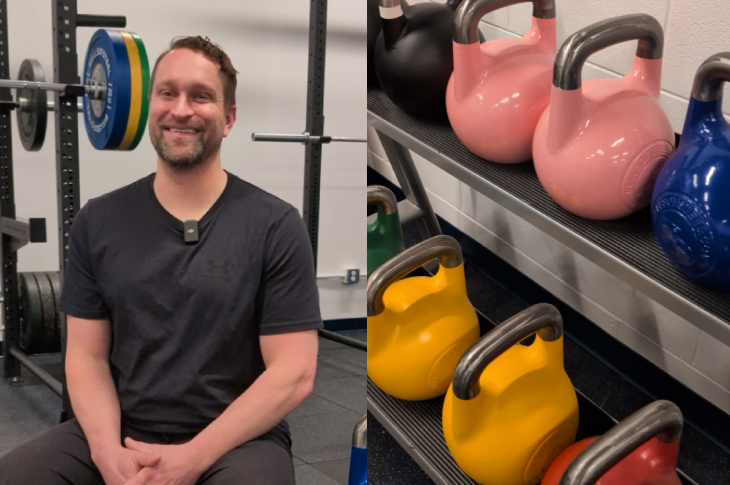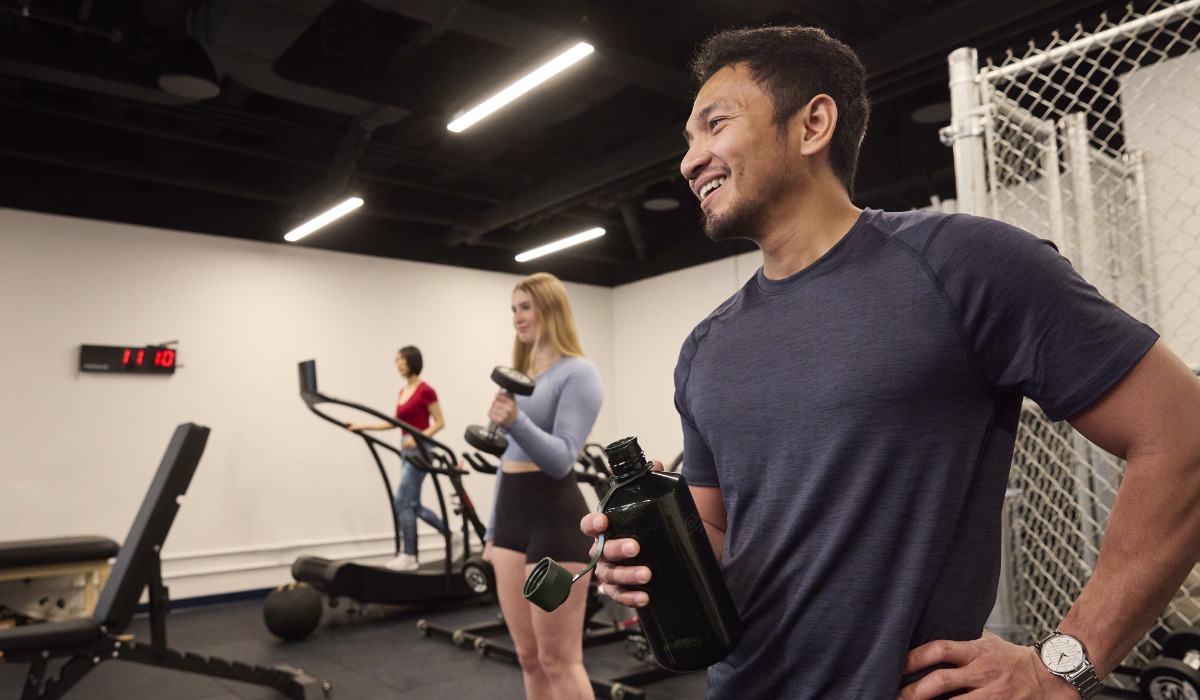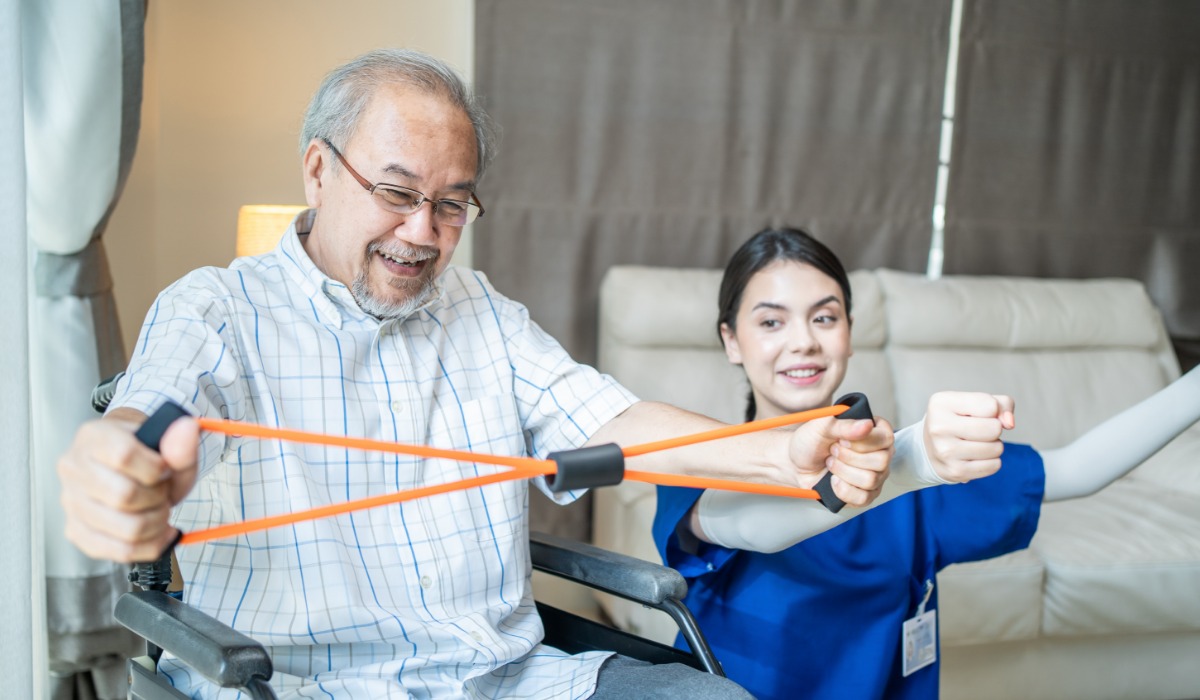Overview
Do you like to motivate others to live a healthier lifestyle? Do you care about supporting people in their health and wellness journey?
Our Fitness and Wellness Management program is designed for those passionate about health and well-being.
In this program, you will:
- learn about the physical and mental aspects of healthy living
- study nutrition to support clients' health and wellness goals
- master the art of conducting safe and effective fitness assessments
- apply knowledge of anatomy, exercise physiology, and biomechanics
- create tailored fitness programs for diverse client needs
- understand the psychological factors affecting physical fitness and sports
- enhance your ability to motivate, understand, and support clients
- acquire digital skills for online fitness coaching and program delivery
- learn strategies to attract and retain program members
- develop business acumen for managing and growing fitness programs
If you want to make a tangible impact on community health, fitness, and wellness and are keen on pursuing a career that offers both personal fulfillment and professional growth, this program is for you.

SAITsplained: How does resistance training actually make you stronger?
Fitness and Wellness Management Instructor Dustin Moore breaks down the science of this popular workout — and how it holds up to cardio
Those in fitness and wellness management tend to be social, methodical, and innovative.
You need:
- emotional maturity and a healthy lifestyle
- self-confidence
- honesty, patience and empathy
- to be highly organized
- the ability to motivate and encourage people
- the ability to think quickly and adapt to unexpected changes.
Some roles in this field require shift work and extended hours, including nights and weekends.
You should enjoy living a healthy lifestyle, developing new ways to promote good health, and helping others achieve personal health goals.
You are strongly encouraged to refer to the ALIS website for career, learning, and employment information for personal trainers and group exercise leaders to ensure you can successfully meet the occupational requirements for the program and profession.
You will participate in two required practicum placements, with consideration given to your preference of location. However, due to limited availability in Calgary, it might be necessary for you to travel or relocate outside the city.
The healthcare field has a strong focus on health, wellness, and fitness to practice due to the demanding nature of the work and Occupational Health and Safety requirements. As such, special considerations will not be granted based on individual circumstances or preferences, except those stated as protected grounds when an accommodation has been approved.
In compliance with the practica agreements with our clinical partners, you will be required to provide specific documentation before you can participate in your practicum. Find out what requirements you need for this program.
International students must also complete their Immigration Medical Exam (IME) and obtain a co-op work permit to attend practicum. For more information, please contact the International Centre.
This program is recognized as one of the Canadian Society for Exercise Physiology recommended course maps and will prepare you to pursue Certified Personal Trainer (CPT) certification.
In addition, you'll also be eligible to apply for the Health and Fitness Federation of Canada Certified Personal Trainer (HFFC- CPT) certification.
Upon successful completion of this program, you'll be awarded a SAIT Fitness and Wellness Management diploma.
Careers and opportunities
Our graduates may work in the following occupations. Some careers require additional experience and education.
Associated National Occupational Classification (NOC) codes: 41404, 41406, 50012, 54100.
Career planning support
Unsure which career path is for you? Here are some recommended career planning resources to help you decide your future.
You can also head to Alberta alis for lots of information about careers in Alberta, including quizzes and labour market information to help you narrow down a path.
Finally, you can take our online career finder quiz, which can help narrow your options based on your current skills and interests.
Courses
The Fitness and Wellness Management diploma requires 67.5 credits (24 courses) to complete.
The program spans two years, with three semesters each year.
| Course | Credits |
|---|---|
|
This course provides an introduction to financial accounting from the perspective of the user who makes decisions based on financial information. The course includes an introduction to the accounting framework, generally accepted accounting principles and financial statements. Accounting concepts such as accounting for cash, accounts receivable, assets, liabilities, sales and inventories, are covered in the context of how they are applied to decision making. Decision analysis regarding corporate ownership and application of financial ratios will also be studied. Equivalents:
|
3 |
|
This course provides an overview of the basic anatomy and physiology of the human body. While focusing on the functions, structures and processes of the different body systems you will learn about anatomical positions, cells, muscle fibers, bones and joints, the spinal cord, sensory receptors, hormones, the major organs and digestion. Other topics covered in this course include healing, immunity, aging, the body's adaptive responses to sickness and disease, the menstrual cycle, and reproduction. |
3 |
|
This applied computer course provides students with critical electronic communications, data and file management skills, along with a strong focus on using common productivity applications to format, calculate, analyze, visualize, and present or report data and information. Equivalents:
|
1.5 |
|
Entrepreneurship is a course offering you insights and experience into the dynamic environment of entrepreneurial thinking and innovation. Working individually through guided content and discoveries, you will evaluate yourself and case studies to identify mindset and career opportunities. In teams, you will work through the development and presentation of an applied business plan to explore the many integrated facets of business in entrepreneurial ventures. Your research, self discovery, application and collaboration skills will be developed and reinforced as you progress through the journey of entrepreneurship and innovation. Pre-requisites:
Equivalents:
|
3 |
|
This course is an introduction to biomechanics and physiology as it applies to exercise. Students will explore how the body produces motion using kinematics and kinetics. Students will examine the impact of environment, age, and biological sex on exercise performance, as well as acute and chronic adaptations of various physiological systems in response to exercise. Pre-requisites:
|
3 |
|
This course introduces the concepts and principles of psychological and social factors that apply to the facilitation of health, sport and physical activity. Topics will examine concepts that explain human behaviour and participation in sports and exercise. |
3 |
|
This course will introduce you to theory and terminology related to training and exercise. The main topics covered in this course include the general benefits of exercise, resistance training for muscle development, trends and developments in the fitness industry, effective warm-up and stretching routines, and the fundamentals of cardiovascular training. You will also learn how to apply instructional techniques for individual and group-based activities, how to use a needs assessment to help clients meet their fitness goals, and how to establish healthy trainer and client relationships. |
3 |
|
Building on concepts previously introduced in the program, students will explore the theory and practice of resistance training. Students will learn concepts related to resistance training, muscle physiology, and more advanced strength training techniques. Pre-requisites:
|
3 |
|
Students will look at the theory behind functional movement and apply the concepts across a variety of age spans. The impact of lifespan on mobility and functional movement will be examined. Students will examine concepts of physical literacy and long-term development in sport and activity. Pre-requisites:
|
3 |
|
Students will apply theory learned in previous courses to perform physical fitness assessments and exercise prescription for optimal program designs. Using a hands on approach, learners will hone their skills with numerous fitness assessments. Students will complete a capstone project that includes physical assessment, program design, and program delivery with a client. Emphasis will be placed on safety, technique, client communication, leadership, and industry best practices. Pre-requisites:
|
3 |
|
This course will apply an integrated multidimensional approach to health and wellness. This approach highlights the physical, emotional, spiritual and environmental elements of health and wellness. While focusing on these dimensions you will learn how health and wellness are impacted by emotional intelligence, interpersonal relationships, spiritual connections, the natural environment and many other interrelated factors linked to overall health. You will also learn about the importance of continuous education and evidence-based approaches to health promotion. |
3 |
|
This course introduces the benefits of, and rationale for, outdoor leadership. Students will learn key leadership concepts and apply them to the outdoor setting. In addition, they'll participate in outdoor activities unique to the Bow Valley Corridor and/or their own practicum location. |
1.5 |
|
This course looks at the best practices in the prevention and care of athletic injuries. Students will examine their scope of practice. This is a blended course that will use theory and lab to give students the opportunity to recognize common injuries and apply basic immediate care, including taping techniques. Pre-requisites:
|
3 |
|
This course introduces health promotion across a variety of wellness domains. You'll explore concepts in population health, conduct health and wellness assessments, and learn how to implement a health promotion activity. You'll apply theories and models in behaviour change to real-world contexts, including schools, the community, and workplace settings. You'll also examine principles for coaching and motivating clients for long term behavioural change. Pre-requisites:
|
3 |
|
This course develops student theoretical knowledge in fitness assessment and exercise prescription. Learners will explore the processes and techniques used to complete a thorough fitness assessment for a diverse range of clients. Principles and tools used for interviewing clients will be examined Students will examine how to design safe and effective exercise programs based on client interviews, proper exercise techniques, and exercise training principles. Pre-requisites:
|
3 |
|
In this course students will explore the theory and application of mindfulness in fitness and wellness. Students will explore mindfulness in yoga and other activities. Students will further discover the concepts of resilience and stress management through the lens of mindfulness. Pre-requisites:
|
3 |
|
Understanding the barriers people face and then working to remove or mitigate them ensures that everyone has the opportunity to enjoy physical activity. In this course, you'll begin by exploring accessibility standards to promote inclusion. You'll also examine and apply strategies and adaptations that allow individuals living with cognitive, psychomotor, and physical impairments to participate in physical activity and sport. You'll conclude the course by facilitating an adapted sport and activity session. Pre-requisites:
|
3 |
|
In this course, you will develop a practical approach to using digital, social and mobile platforms that achieve business goals. Current applications and tools, community management practices and legal/privacy issues related to digital marketing tactics will be examined. Teams will develop a digital plan that specifies the use of email, websites, SEO, social media and mobile marketing, all with the goal of targeting and delivering effective communication to digital media-savvy audiences. An emphasis is placed on the return on digital marketing investment and on building relationships that lead to a culture of trust. Equivalents:
|
3 |
|
This course places a strong emphasis on professional selling practices, ethical conduct, and Customer Relationship Management (CRM) in sales activities. It explores the creation of long-term organizational value through customer relationships while examining the evolution of the sales profession. Market analysis methods for identifying growth opportunities and key customer segments are covered extensively. Furthermore, significant attention is given to customer-centric selling techniques, including relationship building, needs analysis, and comprehensive CRM strategies. The course also addresses vital aspects of managing a sales team, encompassing organizational structuring, sales forecasting, recruitment, training methodologies, performance evaluation, legal and ethical considerations within the sales domain. Equivalents:
|
3 |
|
This course introduces the fundamentals of human nutrition in relation to healthy living and national standards for nutrition. This course will focus on the six essential nutrients found in foods, factors that impact food choices, the role of diet in preventing chronic diseases, and how medical conditions impact health and wellness. You will also learn about key characteristics of a healthy diet, the anatomy of the digestive tract, common digestive disorders, and how macronutrients, micronutrients, and water contribute to overall health. |
3 |
|
The course covers nutritional principles and guidelines for physical activity, training, and competition. In addition, sports-related topics such as strength-building, nutrition principles, physiology of movement and metabolism will be studied. Students will explore a variety of individual and team-based sports, focusing on the nutrition requirements of athletes. Students will begin to explore their passion and observe potential practicum placements. Pre-requisites:
|
3 |
|
This practicum course introduces students to the personal training and group fitness industry. Designated fitness facility partners will guide students through the required competencies. Under supervision, students will professionally interact with certified personal trainers and group fitness instructors, facility members and staff to gain extensive practical experience in delivering personal training services. This practicum experience will also include reflective learning practices. Pre-requisites:
|
3 |
|
This course provides an immersive, hands-on experience in fitness and wellness, emphasizing leadership, client engagement, and advanced exercise principles. Students will lead fitness sessions, perform client assessments, and collaborate with fitness and wellness professionals. Reflective practice is integrated throughout, promoting professional growth and leadership development within the fitness and wellness industry. In addition, students will explore business strategy and management related to their placement, gaining a comprehensive understanding of fitness operations. Pre-requisites:
|
3 |
|
As future health care professionals, students in this course will require strategies for working effectively and respectfully within interdisciplinary teams. The course examines topics such as conflict management, problem solving, decision making, customer service, leadership, ethics and values in the health care workplace. |
1.5 |
Progression
You must attain a PGPA and/or a CGPA of 2.0 or better each semester and pass the prerequisite courses to progress through the program.
To qualify for graduation, you must pass all courses, attain a CGPA of 2.0 or better and complete course requirements within the prescribed timelines.
Review our grading and progression procedure >
Explore your options!
Some courses in this program are available through Open Studies. You can complete courses via Open Studies to get a head start on your education, reduce your course load once accepted into a credentialed program, or determine which career path best suits you before you fully commit.
You may also take courses for general interest or personal and professional development.
Admission requirements
Applicants educated in Canada
All applicants must demonstrate English language proficiency and meet the following requirements or equivalents:
- at least 65% in Biology 30 or Science 30, and
- at least 65% in Math 20-1 or Math 20-2, and
- at least 65% in English Language Arts 30-1 or English Language Arts 30-2.
SAIT accepts high school course equivalents for admission for applicants educated outside Alberta.
All applicants who were educated outside of Canada must demonstrate English language proficiency and provide proof they meet the program admission requirements outlined above with an international document assessment. Find accepted educational documents and assessment options.
SAIT may also accept courses completed at certain international post-secondary institutions.
Academic Upgrading
Missing an admission requirement for this program? Upgrade your prior education to help you receive admission into one of SAIT's career programs.
English language proficiency
All applicants must demonstrate English language proficiency prior to admission, including students educated in Canada.
Transfer agreements
At SAIT, we have created transfer agreements with partner institutions to allow you to earn course credits toward your SAIT program based on your previously completed credentials.
Transfer Alberta search tool
Use the Transfer Alberta search tool to see all transfer agreements between Alberta post-secondary institutions (including those with the University of Calgary, Mount Royal University and Bow Valley College.)
Search transfer agreements in Alberta
Transfer options for graduates
When you have completed this program, you may continue your education at a partner post-secondary institution. These transfer agreements include partnerships within and/or outside of Canada.
Available intakes
Fall 2026
Start dates:
- Domestic students: Open
-
-
Application deadline: June 30, 2026
-
- International students: Open
-
-
Application deadline: May 29, 2026
-
Costs
2025/26 tuition and fees
The following costs are effective as of July 1, 2025.
The estimated total cost of tuition and fees is based on the suggested schedule of study. Following a modified schedule will impact the fees you pay per semester and may alter final costs.
Domestic students
*.5 indicates a combination of full-time semester(s) and part-time semester(s) in the same academic year. In many cases, students are completing a practicum during their part-time semester. Part-time students are those taking less than nine (9) course credits in a semester. You are not eligible for the UPass during a part-time semester.
The program total is based on the estimated amount you will pay if you enter this program during the 2025/26 academic year. The program total amount listed on your letter of admission may appear higher. This amount is your maximum tuition guarantee for the program. SAIT will not exceed this maximum, regardless of changes in tuition and fees between academic years.
*.5 indicates a combination of full-time semester(s) and part-time semester(s) in the same academic year. In many cases, students are completing a practicum during their part-time semester. Part-time students are those taking less than nine (9) course credits in a semester. You are not eligible for the UPass during a part-time semester.
Books and supplies are approximately $1,000 to $1,500 per full-time year.
This is a bring-your-own-device program with a standard computer hardware and software requirement. See the specific requirements on our computers and laptops page.
An Apple or Windows-based laptop or tablet is preferred to other device types. Phones are not suitable.
Find your booklist on the SAIT Bookstore's website. Booklists are created by semester and available approximately two weeks before classes begin.
Additional fees
You are responsible for additional expenses related to your practicum, including pre-practicum requirements and relocation costs to practicum sites outside of Calgary.
Financial aid
Paying for your education may feel overwhelming, but we have resources and programs that can help, including information about payment options, student loans, grants and scholarships.
Application process
Ready to apply?
Follow our step-by-step guide to submitting a successful application.
Communication during admission
Email is the primary source of communication during the admission process. Ensure your personal email account is managed appropriately to receive our emails, files and communications.
We recommend you add hps.info@sait.ca domain to your safe senders' list or you risk missing critical email messages.
Begin your application
Apply now using the online application portal.
Ensure you have a valid Visa or Mastercard to pay the non-refundable application fee of $120 for domestic applicants or $175 for international applicants.
Information sessions
Prepare for a strong start in your chosen program or get the details you need to decide your future path.
Our expert staff and faculty are ready to answer your questions and provide information about the following:
- What sets SAIT apart
- An introduction to the program and area of study
- Admission requirements
- Future career paths
- Information on the earning potential and graduate employment rates.
Contact us
School of Health and Public Safety Advising
-
Email - hps.info@sait.ca
International Student Advising
-
Phone - 403.284.8852
-
Email - international@sait.ca
Subscribe for updates
Your journey starts here! Sign up to get important updates on:
- Health and medical programs
- Application information
- Relevant news and events

Oki, Âba wathtech, Danit'ada, Tawnshi, Hello.
SAIT is located on the traditional territories of the Niitsitapi (Blackfoot) and the people of Treaty 7 which includes the Siksika, the Piikani, the Kainai, the Tsuut’ina and the Îyârhe Nakoda of Bearspaw, Chiniki and Goodstoney.
We are situated in an area the Blackfoot tribes traditionally called Moh’kinsstis, where the Bow River meets the Elbow River. We now call it the city of Calgary, which is also home to the Métis Nation of Alberta.



